
William Harvey Carney was an American soldier during the American Civil War. Born enslaved, he was awarded the Medal of Honor in 1900 for his gallantry in saving the regimental colors during the Battle of Fort Wagner in 1863. The action for which he received the Medal of Honor preceded that of any other African American Medal of Honor recipient; however, his medal was actually one of the last to be awarded for Civil War service. Some African Americans received the Medal of Honor as early as April 1865.

Uriah Galusha Pennypacker was a Union general during the American Civil War. He may be the youngest person to hold the rank of brigadier general in the US Army and remains the only general too young to vote for the president who appointed him. He was awarded the Medal of Honor for his leadership at the Second Battle of Fort Fisher during the Civil War.

William Joyce Sewell was an American Republican Party politician, merchant, and military officer who served as a U.S. Senator from New Jersey for two non-consecutive terms from 1881 to 1887 and 1895 until his death in 1901.
Joseph H. De Castro was the first Hispanic American to be awarded the United States's highest military decoration for valor in combat—the Medal of Honor—for having distinguished himself during Pickett's Charge in the Battle of Gettysburg of the American Civil War.

Richard Conner was an American Civil War Union Army soldier who received the Medal of Honor for his bravery in action.

Thomas R. Hawkins was an African-American Union Army soldier during the American Civil War and a recipient of America's highest military decoration—the Medal of Honor—for his actions at the Battle of Chaffin's Farm.

Alexander Kelly was an African-American coal miner and native of Pennsylvania who fought with the Union Army as a member of the 6th United States Colored Infantry Regiment during the American Civil War. He was awarded his nation's highest military decoration—the U.S. Medal of Honor—for his gallantry in the Battle of Chaffin's Farm, Virginia on September 29, 1864.
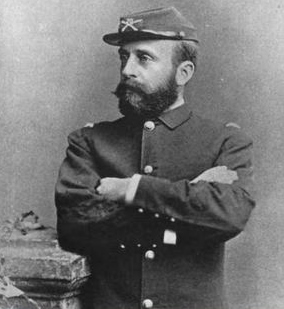
Sylvester Bonnaffon Jr. was a United States soldier who fought with the Union Army during the American Civil War as a first lieutenant with Company G of the 99th Pennsylvania Infantry. He received his nation's highest award for valor, the U.S. Medal of Honor, for his gallantry and leadership against Confederate troops during the Battle of Boydton Plank Road, Virginia on October 27, 1864. That award was conferred on September 29, 1893.

Jacob Gellert Frick Sr. was a United States infantry officer who fought with several Union Army regiments during the American Civil War, including as lieutenant colonel of the 96th Pennsylvania Infantry and as colonel of the 129th Pennsylvania Infantry. He received his nation's highest award for valor, the U.S. Medal of Honor, for his gallantry during the battles of Fredericksburg and Chancellorsville, Virginia. Grabbing the American flag from his regiment's color-bearer at Fredericksburg on December 13, 1862, he inspired his men to move forward "through a terrible fire of cannon and musketry"; at Chancellorsville, he personally engaged in hand-to-hand combat on May 3, 1863, to retrieve his regiment's flag which had been captured by the enemy. He was 67 years old when his Medal of Honor was conferred on June 7, 1892.
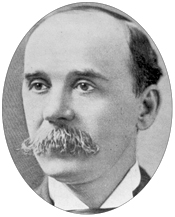
Alexander Scott was a soldier in the Union Army during the American Civil War and a recipient of the Medal of Honor for his actions in the Battle of Monocacy, Maryland.
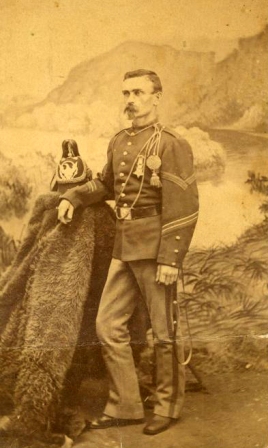
John W. Comfort was an American soldier in the U.S. Army who fought during the American Civil War and the Indian Wars from 1861 until his retirement in 1892. He was a member of the 4th U.S. Cavalry during the Texas–Indian Wars and, while battling the Kiowa and Comanche in the Staked Plains in November 1874, killed a Native American in armed combat. He was one of several soldiers cited for bravery in this battle and received the Medal of Honor the following year.

George H. Eldridge was an American soldier in the U.S. Army who served with the 24th Michigan Volunteer Infantry in the American Civil War and the 6th U.S. Cavalry during the Texas–Indian Wars. He received the Medal of Honor for gallantry fighting the Kiowa Indians and Chief Kicking Bird at the Battle of the Little Wichita River on July 12, 1870.
Sergeant Charles Blucher was a German soldier who fought in the American Civil War. Blucher received the United States' highest award for bravery during combat, the Medal of Honor, for his action during the Battle of Chaffin's Farm at Fort Harrison in Virginia on 29 September 1864. He was presented with the award on April 6, 1865.
Charles F. Cleveland was an American soldier who fought in the American Civil War. Cleveland received the country's highest award for bravery during combat, the Medal of Honor, for his action during the Battle of Antietam in Maryland on 17 September 1862. He was honored with the award on 12 June 1895.
Sergeant George Henry Doré was an English soldier who fought in the American Civil War. Doré received the United States' highest award for bravery during combat, the Medal of Honor, for his action during the Battle of Gettysburg in Pennsylvania on 3 July 1863. He was honored with the award on 1 December 1864.
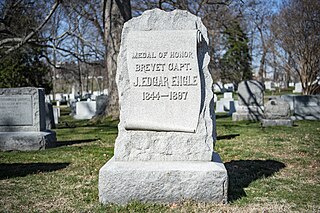
Sergeant James Edgar Engle was an American soldier who fought in the American Civil War. Engle received the country's highest award for bravery during combat, the Medal of Honor, for his action during the Bermuda Hundred Campaign in Virginia on 18 May 1864. He was honored with the award on 17 December 1896.
Sergeant Augustin D. Flanagan was an American soldier who fought in the American Civil War. Flanagan received the country's highest award for bravery during combat, the Medal of Honor, for his action during the Battle of Chaffin's Farm in Virginia on 29 September 1864. He was honored with the award on 6 April 1865.
James John Drury was an Irish soldier who fought in the American Civil War. Drury received the United States' highest award for bravery during combat, the Medal of Honor, for his action during the Battle of Jerusalem Plank Road in Virginia on June 23, 1864. He was honored with the award on January 18, 1893.
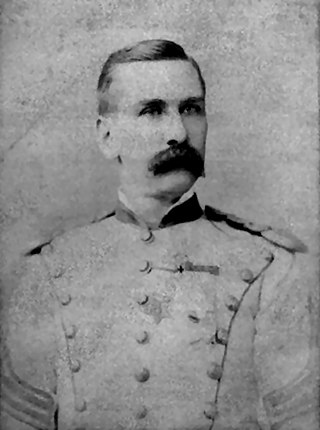
Joseph Fisher was an American soldier who fought in the American Civil War. Fisher received the country's highest award for bravery during combat, the Medal of Honor, for his action during the Third Battle of Petersburg in Virginia on 2 April 1865. He was honored with the award on 16 January 1894.
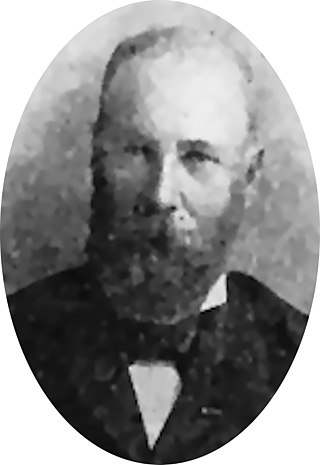
Philip Petty was a British American soldier who fought in the American Civil War. Petty received the Medal of Honor for his action in the Battle of Fredericksburg on December 13, 1862.













